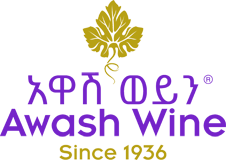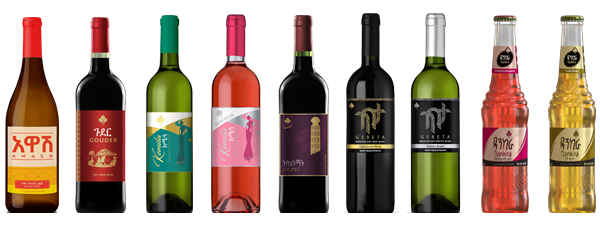Sustainability
Corporate Social Responsibility (CSR)
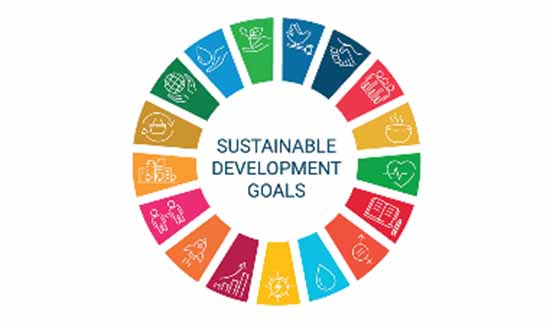 Awash Wine’s farm is located in a community which faces various challenges in meeting their basic needs. Awash Wine has a strong commitment to support the community to address some of their basic social needs in line with the Sustainable Development Goals (SDGs).
Awash Wine’s farm is located in a community which faces various challenges in meeting their basic needs. Awash Wine has a strong commitment to support the community to address some of their basic social needs in line with the Sustainable Development Goals (SDGs).
We back our Corporate Social Responsibility commitments with a variety of initiatives and programs that promote, measure, track and improve the community’s livelihood. The SDG goals cover many different areas and do not exist in silos. For instance, improving education helps lift more people out of poverty and provides more equal opportunities. The following are some of our major projects aligned with the SDG goals.
Read More
SDG 3: Health
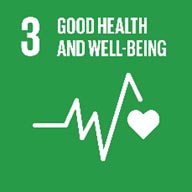 At the company level Awash Wine has a Health and Wellness programme which provides healthcare services to all its employees. There are four primary clinics and one pharmacy in which health providers provide both preventive and curative healthcare services primarily to the staff. For the farm community in Merti and its neighbourhood, Awash Wine distributed agober and anti-malaria spray, folic acid tablets for pregnant women and provides family planning services. The Farm clinic works in collaboration with the woreda to provide primary care, referring more complicated cases to a nearby hospital.
At the company level Awash Wine has a Health and Wellness programme which provides healthcare services to all its employees. There are four primary clinics and one pharmacy in which health providers provide both preventive and curative healthcare services primarily to the staff. For the farm community in Merti and its neighbourhood, Awash Wine distributed agober and anti-malaria spray, folic acid tablets for pregnant women and provides family planning services. The Farm clinic works in collaboration with the woreda to provide primary care, referring more complicated cases to a nearby hospital.
Awash Wine built a clinic and provided medical furniture to the Dole Community health post. The clinic provides services to over 1000 people annually.
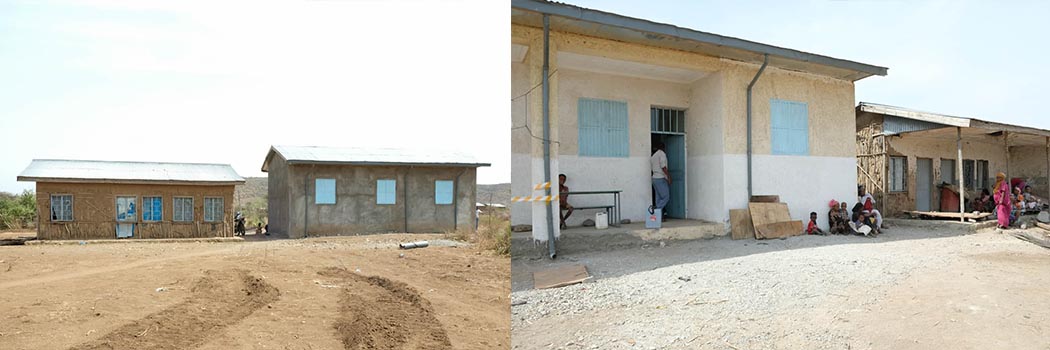
Figure 1. New Dole Clinic
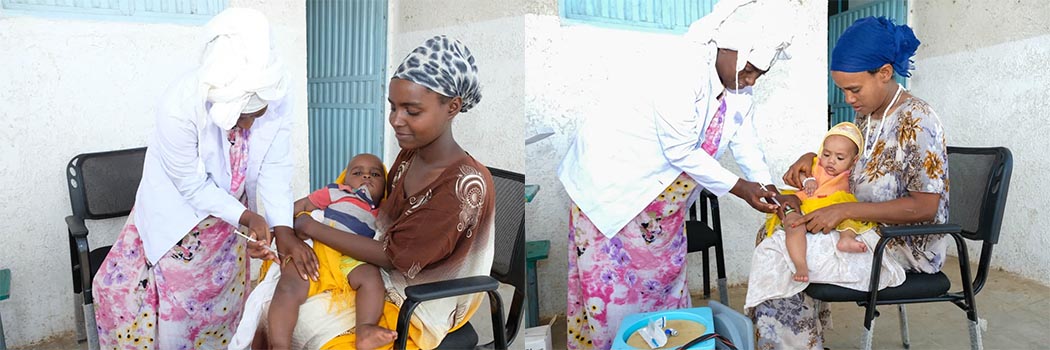
Figure 2. Vaccination at work
SDG 4: Education
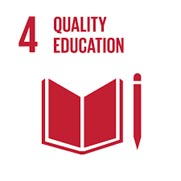 One of the critical challenges for the community is the absence any kindergarten or pre-KG facility. As a result, parents are forced to stay home until their children reach school age. In order to alleviate this problem Awash Wine constructed two schools in two communities. Currently there are more than 300 children enrolled. Awash Wine provides the budget for running the two schools including teachers’ salaries, student uniforms, etc.
One of the critical challenges for the community is the absence any kindergarten or pre-KG facility. As a result, parents are forced to stay home until their children reach school age. In order to alleviate this problem Awash Wine constructed two schools in two communities. Currently there are more than 300 children enrolled. Awash Wine provides the budget for running the two schools including teachers’ salaries, student uniforms, etc.
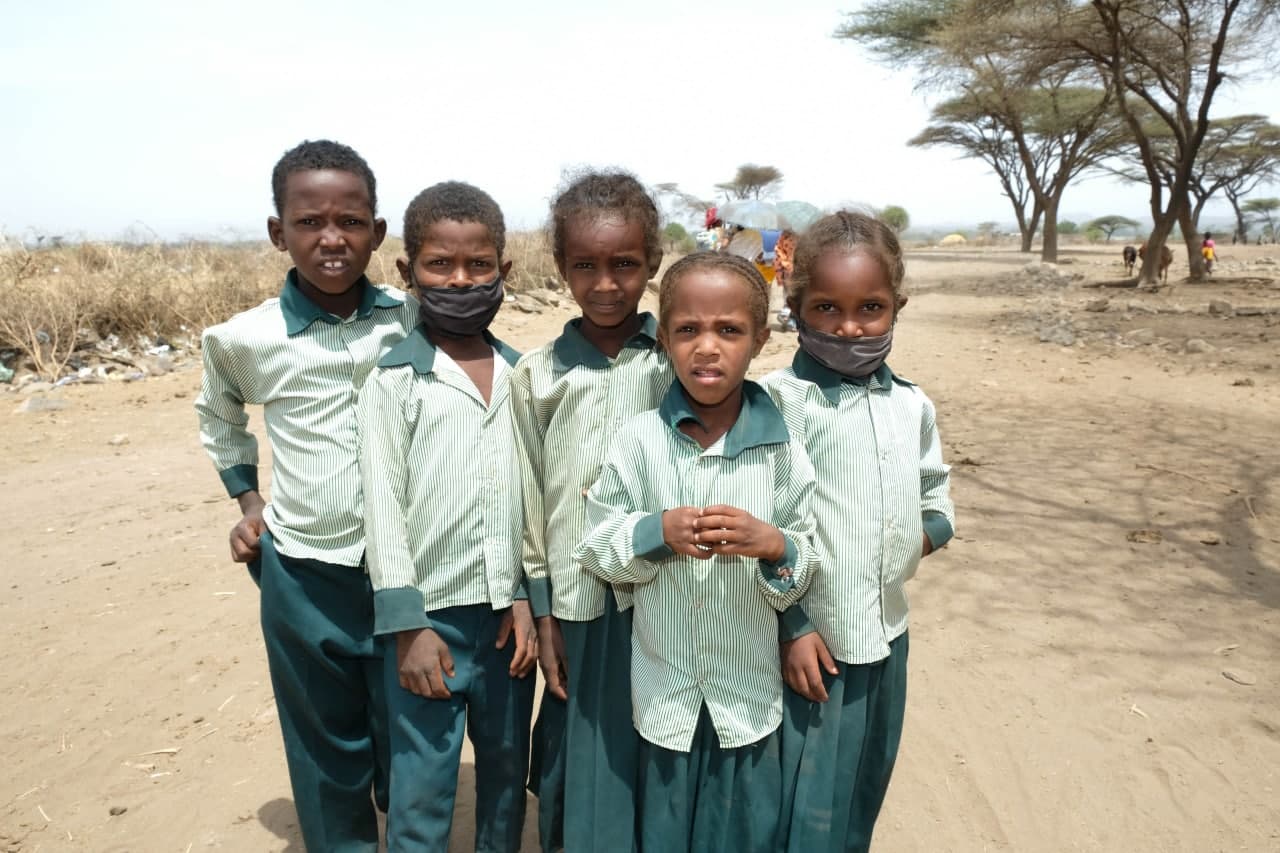
In the area of adult education as well, Awash Wine provides an evening education programme for the community.
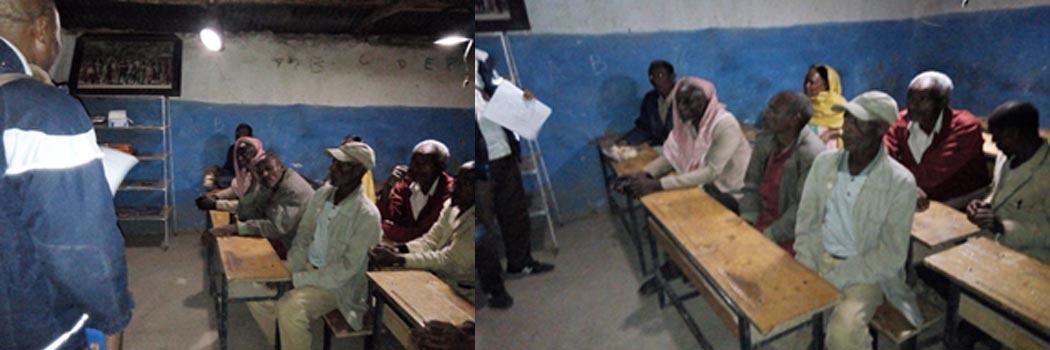
School expansion: – Merti woreda school provide education only upto grade 8 and upon completion must go to the town of Abomsa, more than 25 Km away, to continue their secondary education. This at time contribute to a high level of drop out. In this regard, Awash is provided support to Merti school to build two new blocks that enabled the school to provide grade 9 and grade 10.
SDG 6: Water and Sanitation
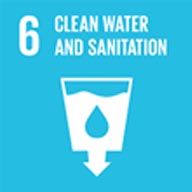 For many years, the community surrounding the farm didn’t have access to clean drinking water. All three sub kebeles were almost in a similar dire conditions regarding their water supply. People and animals use the same source of water from the canal. Commonly the communities use rivers and ponds for their water supply. Because of shortage of clean water supply the communities are vulnerable to waterborne diseases. Awash Wines recognize the responsibility to provide access to water for the community and their livestock. The baseline survey we conducted indicated clean drinking water and sanitation as one of the priorities for the community.
For many years, the community surrounding the farm didn’t have access to clean drinking water. All three sub kebeles were almost in a similar dire conditions regarding their water supply. People and animals use the same source of water from the canal. Commonly the communities use rivers and ponds for their water supply. Because of shortage of clean water supply the communities are vulnerable to waterborne diseases. Awash Wines recognize the responsibility to provide access to water for the community and their livestock. The baseline survey we conducted indicated clean drinking water and sanitation as one of the priorities for the community.
Awash Wine developed two boreholes, built two tanks with the capacity to hold 50,000 liters each and provided water taps close to their homes. The water pipe runs over 3 kms to reach to the three kebeles. Clean drinking water is now provided to over 1,200 people every day.
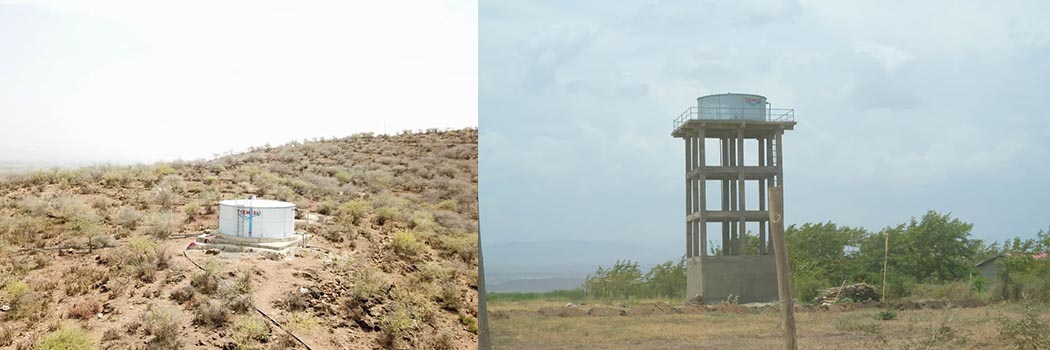
Figure 3. 50K water towers
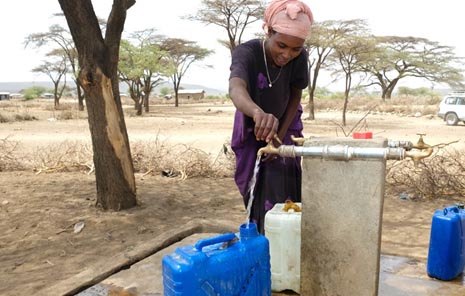
Figure 4. Happy faces
In a bid to equip the employees with proper hygiene facilities, Awash Wine constructed 3 sanitation blocks with 12 showers and 12 toilets each in the residential sites.
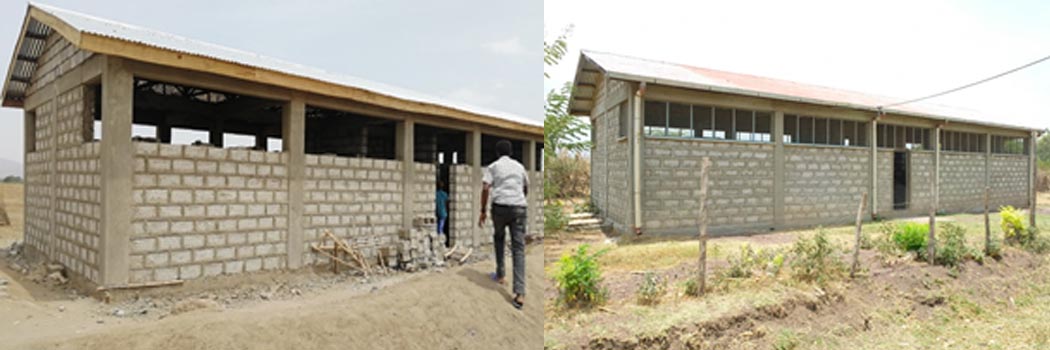
Figure 5. Sanitary Blocks
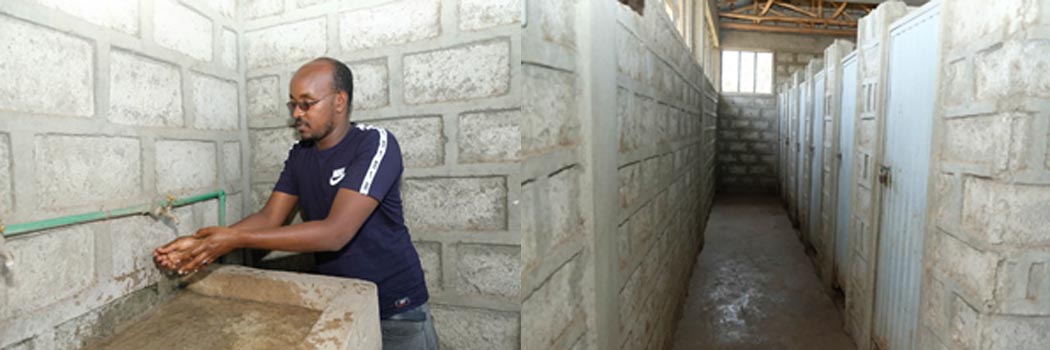
Figure 6. Inside the Sanitary Blocks
SDG 7: Energy
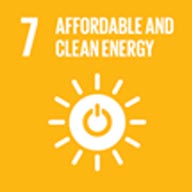 In line with this goal Awash Wine initiated a project to provide electricity to the Harar community by procuring high-capacity transformers, power line installation and provision of electricity to each household. Prior to the current electrification project which will transform the community’s quality of life, Awash Wine made significant investment in solar energy to the community which has been in use for the past four years. The installation of the solar lights was instrumental in improving the quality of life for the community in general and specially the youth as they are able to study in the evening.
In line with this goal Awash Wine initiated a project to provide electricity to the Harar community by procuring high-capacity transformers, power line installation and provision of electricity to each household. Prior to the current electrification project which will transform the community’s quality of life, Awash Wine made significant investment in solar energy to the community which has been in use for the past four years. The installation of the solar lights was instrumental in improving the quality of life for the community in general and specially the youth as they are able to study in the evening.
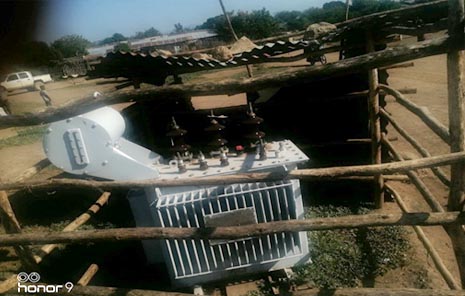
Figure 7. Transformer pending installation
The affordable and clean energy project begun about 4 years ago initially by providing energy saving cooking solutions for 200 households. Awash Wine contracted a workshop established by a youth group in Adama who were trained in energy saving cooking solutions to construct and install the 200 stoves.
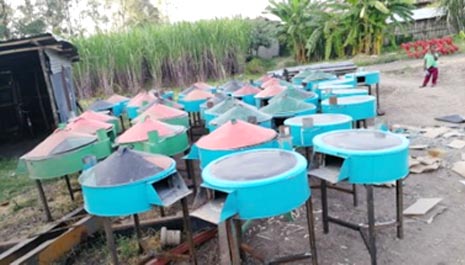
SDG 8: Economic Growth
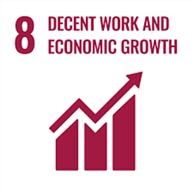 Our winery got its name from the Awash river that has a length of 1,300 km and is the source of livelihood for thousands of small and large industries and farms. However, several communities that live nearby don’t have access to the river and as a result depend on government support year after year as the area is dry and the annual rainfall is unreliable. Realizing this challenge Awash Wine embarked on an irrigation project to benefit about 160 households.
Our winery got its name from the Awash river that has a length of 1,300 km and is the source of livelihood for thousands of small and large industries and farms. However, several communities that live nearby don’t have access to the river and as a result depend on government support year after year as the area is dry and the annual rainfall is unreliable. Realizing this challenge Awash Wine embarked on an irrigation project to benefit about 160 households.
With a cost of over ETB 5 million, Awash Wine invested in the building of a water reservoir that can sufficiently irrigate 80 hectares of land, installed a 2000 meter pipe from the river to the village and pumps to push the water from the canal to the reservoir. As there was no electric line in the area to run the pumps, we also invested in the installation of an electric line including the transformer.
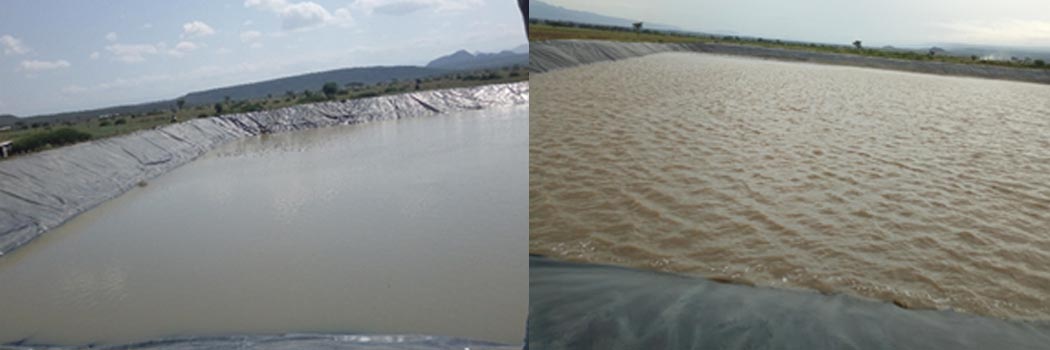
Figure 8. The availability of water has enabled the villagers to plant crops to feed the people.
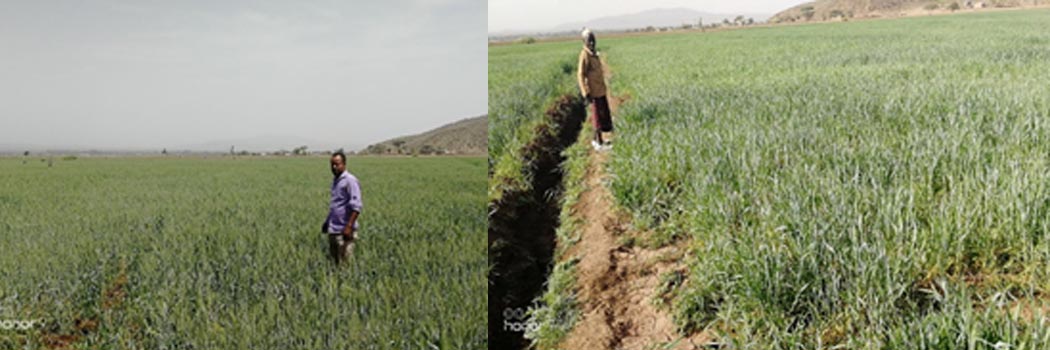
Figure 9. The first yield 2019
Responsible Drinking
Awash Wine SC is a proud member and Wine in Moderation supporter. Wine in Moderation is a global initiative with the ambition to become a movement, imparting respect for wine as a product of culture among people who choose to drink and enjoy it as part of a balanced diet and lifestyle.
The three thematic areas under Wine in Moderation, i.e., Choose, Share and Care symbolize

Choose
- To make informed choices
- Whether or not to drink
- To respect others around you and the wine you drink
Share
- Wine with friends and family, enjoy good moments,
- Wine with good food and water; find the harmony of taste; sense the wine; discover its unique character; drink slowly; take the time to fully appreciate
Care
- Because caring about yourself is caring about the others
- Means enjoying your wine in moderation, avoiding excess and dangerous behaviors; avoiding drinking if you drive, you are underage or pregnant; understanding the drinking guidelines
What is Moderation?
According to the latest scientific evidence*, a low-risk consumption of wine for healthy adults is considered to be:
- Up to 2 drinks Units a day for women (the equivalent of up to 200 ml wine with 12.5 vol%)
- Up to 3 drinks Units a day for men (the equivalent of up to 300 ml wine with 12.5 vol%)
- No more than 4 drinks Units on any occasion.
Alcohol should be avoided in certain situations such as pregnancy, when taking certain medication, driving or operating machinery. These guidelines apply when wine is consumed within a healthy and active lifestyle and the following drinking pattern
- consume wine with the meals,
- alternate every glass of wine with water,
- avoid binge drinking in any occasion.
- If you have doubts, ask your doctor for advice on your drinking habits and your health.
- * For more information on the scientific evidence, please visit the Wine Information Council website. https://www.wineinformationcouncil.eu/
- Please note that no universal drinking guidelines exist, and a wide range of drinking guidelines are published by authorities around the world. If you would like to know whether national guidelines exist in your country, a comprehensive table with all the International Drinking Guidelines can be found on the website of the International Alliance for Responsible Drinking- https://www.iard.org/
Source https://www.wineinmoderation.eu/moderation
When not to Drink
- When Should Drinking be Avoided
- Avoid Drinking and Driving.
Learn More at https://www.wineinmoderation.eu/moderation/drinking-and-driving - Women who are pregnant, planning to become pregnant, or breastfeeding should not drink.
Learn more https://www.wineinmoderation.eu/moderation/pregnancy - Children and young people under the age of 21 should not drink.
Learn more https://www.wineinmoderation.eu/moderation/under-legal-age-individuals-adolescents
- Avoid Drinking and Driving.
- In some situations, not drinking is also the safest option; this includes:
- When taking medication
- In the workplace, Operating machinery
- When taking part in recreational or occupational activities that require a high level of focus
- Former alcohol-dependent individuals or those with a family history of alcohol dependence
